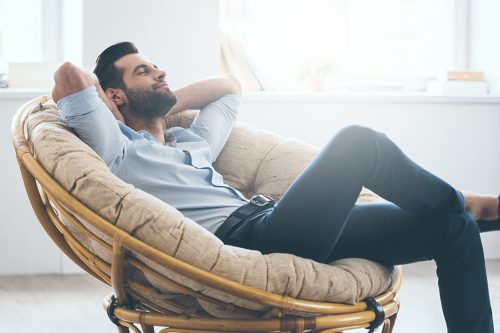From annoying colleagues to fights with your partner, a thousand things can raise your stress level throughout the day. Unfortunately, those small issues can add up, compounding your stress over time.
According to the American Psychological Association’s Stress in America 2017 Snapshot, 80 percent of adults polled reported experiencing stress in the past month. Study subjects reported symptoms ranging from depression to headaches. Worse yet, research suggests that stress can weaken your immune system and increase your risk for both heart disease and stroke.
While many sources of stress are beyond our control, there are steps we can take to lower our stress level right this second. Dr. Jennifer Wolkin, PhD, a New York-based licensed clinical health professional, neuropsychologist, and founder of BrainCurves, recommends stretching your “psoas” muscles to reduce your stress quickly.
“They are the only muscles that connect the spine to the legs, attaching from the 12th thoracic vertebra to the 5th lumbar vertebra through the pelvis and down to the femurs. Needless to say, the psoas muscles, therefore, play a crucial role in one’s core structural wellness,” says Dr. Wolkin. “The absolutely mind-blowing understanding regarding the psoas muscles though, is that they have been actually touted as instrumental to one’s mental well-being as well!”
Now, there are two ways to stretch your psoas muscles. If you’re in public—say, at work—the best way is by doing a standing lunge.

At home or in private, you can enjoy a deeper stretch by lying on your back with your feet on the floor and bringing your pelvis upward.

When you’re stressed, says Dr. Wolkin, it tends to cause shallow breathing. When that happens, it constricts the psoas muscles, exacerbating the stress response. “This would also mean that an over-constricted psoas, caused by poor posture for example, could actually elicit fear. So, after hours and hours of sitting in a position that constricts our psoas muscles, it’s no wonder we have a visceral feeling of tension that seems to envelop our minds, bodies, and brains.”
Dr. Wolkin says that allowing yourself personal time, whether that means a second to readjust your posture or saying no to an invitation, is crucial self-care.
“There are going to be many moments throughout the day that call upon us to choose how to show up for ourselves and others,” says Dr. Wolkin. “Practicing taking this pause can help us with making more conscious choices.”












